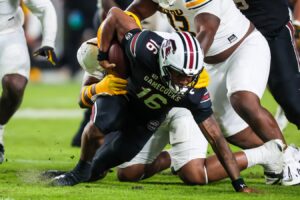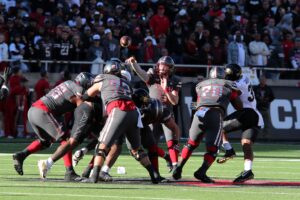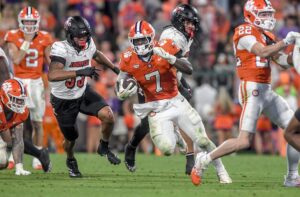Takeaways From WVU’s Win in Fort Worth
In its first six games this season, the West Virginia Mountaineer defense managed just four takeaways. Against TCU, they nearly doubled that number by adding three to their total. As a result, we will stick with the theme. Here are our three takeaways from WVU’s win in Fort Worth.
Mountaineers Establish the Run
TCU, simply, has not been good against the run. That said, West Virginia played several games against run-porous defenses so far this season. Even in those games, they have not been able to establish the run nearly as effectively as Saturday night. That is our first takeaway from WVU’s win. Removing the lone sack TCU managed, the Mountaineers ran the ball 40 times for 236 yards, averaged just shy of six yards per carry.
The effort in the run was effectively balanced. Tony Mathis emerged as a true number two back and tallied 19 snaps (over 25% of the total) for his effort. We have been writing throughout this season that Leddie Brown has been carrying too much of the load. The staff answered our calls. Importantly, Mathis looked effective, as he carried the ball 12 times for 48 yards.
Garrett Greene also ran the ball twice for 69 yards, ripping off an impressive 67-yard scamper in the second quarter. We watched that play a dozen times, and, almost as eye-opening as the run itself, we noticed the offensive line was engaged well and opened up clear lanes for Greene. Indeed, the offensive line also played its best game of the reason.
Now, let’s talk about how these 14 carries from Mathis and Greene helped out Brown. In the first half, Brown rushed 12 times and accumulated 49 yards. In the second half, however, Brown carried the ball another dozen times but piled up 62 yards. If Brown’s efficiency improved in the second half of a game this season before last Saturday, we would be surprised. Simply, the load-sharing kept his legs fresh. (Those numbers, by the way, do not include a 38-yard scamper called back on a hold by Wyatt Milum.
Mountaineers Limit Mistakes
Speaking of mistakes, the Mountaineers made very few. One key theme of the season has been this: West Virginia’s mistakes have been numerous and costly. They repeatedly stalled drives with procedure penalties, holds, errant snaps, and mistakes.
However, West Virginia scored on all of its first four drives. If we exclude the half-ending drive in which West Virginia ran one play to let the clock expire, they scored on all of their first-half drives. What was the difference? Well, there were two. First, the West Virginia offense committed just a single penalty, a false start on Brandon Yates, in the first half. Second, the offensive line kept the pocket clean (zero pressures in the first half). As a result, the offense worked methodically and ate up the clock. At the end of the first half, West Virginia held the ball 17:36 to TCU’s 12:24.
In the second half, West Virginia scored on just two of its six drives. On a third drive, the Mountaineers were in a position to score, but TCU’s special teams came up big again by blocking a Casey Legg field goal, causing his first miss of the season. For the first of the remaining three drives, the Mountaineers started the half with a holding penalty and could not get anything started.
On the second of these three drives, the offensive line gave up its only sack, and Doege made a few bad decisions trying to get back in front of the sticks. Then, on the final drive, the refs called a hold against Sean Ryan that put the Mountaineers behind the sticks. Because this drive came at the end of the fourth with WVU holding a two-score lead, Head Coach Neal Brown rightfully kept the ball on the ground and ate four minutes off the clock.
[pickup_prop id=”10811″]
Jarret Doege Played an Efficient Game
At this point, nobody will mistake Jarret Doege for a game-breaking quarterback. At his best, however, he can be an effective signal-caller and game manager. Against TCU, he lived up to that billing. Indeed, when we reviewed our first-half notes at halftime, we charged only a single bad play to Doege. Doege threw a ball into double coverage on third down at the end of West Virginia’s first drive. That said, the Horned Frogs missed an interception, and West Virginia put three points on the board.
Otherwise, on that second drive of the first half, we thought Doege managed a solid touchdown drive capped by the first of three Brown touchdowns. On the sixth play, Doege tossed a pass to Isaiah Esdale. Doege managed a heads-up evasion of pressure to sneak the ball in there to extend the drive. Later in that same drive, Doege tossed his second incompletion, but it was a great decision to throw the ball out of bounds.
Doege made a few more bad decisions in the second half, and the results speak for themselves. Again, West Virginia scored on 100% of its drives in the first half but only 33% of its second-half series. We cannot say enough about how well the offensive line played in both facets. In pass protection, they kept the pocket clean on all but two drop-backs. Not surprisingly, those dirty pockets are where Doege made a few of his mistakes.
Regardless, Doege played an excellent game by his standards. He completed 75% of his passes. Doege also put up 257 yards on 28 attempts for an average of just over nine yards per attempt. He did not throw for any touchdowns, but he led three touchdown drives capped by Brown. Doege also stayed turnover-free.
Takeaways from the Win
The defense looked a bit shaky at times, especially in the first half. Max Duggan found the soft spots in the zone for several chunk plays. The Mountaineers, of course, had to put two bodies on Quentin Johnston for much of the game, so Duggan really just capitalized on that. That said, the secondary, in particular, looked shaky at times.
Still, the unit realized what it needed to do in the second half, and they led the charge to preserve (and extend) a lead with three solid takeaways. The first two TCU turnovers resulted from heads-up coverage, and Daryl Porter and Charles Woods both jumped routes for interceptions. Woods added a second turnover when he recovered a fumble that helped seal the win for West Virginia.
We have talked plenty about the defense carrying the load. We weren’t sure whether they would do so, particularly in the second quarter. But when all was said and done, the defense gave up just 10 points (as special teams spotted TCU seven points on the opening kick). As a result, we can’t find fault here either. With those takeaways, West Virginia left Fort Worth with a 29-17 win to move to three wins and four losses on the season. The Mountaineers return home to face Iowa State next weekend.






